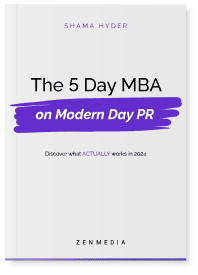Content is critical in getting your brand out in the world, converting leads, bringing in new customers, and maintaining current ones.
But as any brand marketer knows, not all content will be equally successful. To be successful, content must not only be high-quality—it must also be relevant.
Discerning what “relevant” means to your various audiences is, of course, the key. In this post, we’ll cover how you find that out, and how you create relevant content for each of your audiences.
What is relevant content in B2B marketing?
Relevant content is, essentially, the combination of what your brand has to say with what your audience wants to know about.
Relevance is relative, of course, depending on whom you’re speaking to, when you’re speaking to them, and why, but it is possible to develop some general guidelines that can help you create this kind of content on an ongoing, regular basis.
Why do B2B brands need relevant content?
Content relevance is important for every brand in every industry, but it takes on added importance for B2B.
The reason is that B2B buyers today are moving through the majority of their buying journey on their own, online. Without a salesperson to walk them through specs, features, pricing, benefits, and more, how are they going to find the information they need about your brand?
The answer is relevant content.
Before you start thinking: “Well, if a customer is curious about something, they’ll just reach out and ask us!” consider this finding from Gartner.
“Gartner research shows that customers are three times more likely to buy a bigger deal with less regret when suppliers provide information perceived as helpful in advancing the purchase process.”
Your competition is almost certainly doing that by creating relevant content. If you’re not providing that info upfront, where they can easily find it, then they’re likely going to move on to another brand that makes it easier to find what they’re looking for.
How do you know what your audience considers relevant?
What’s relevant for one audience won’t be for another, and what’s relevant today may not be tomorrow.
There are a few things you need to do in order to make sure you’re creating relevant content on a consistent basis.
1. Know your audience(s).
Understanding your audience is the first step in creating relevant, effective content.
If you don’t have an audience or buyer personas created, now is the time to do that. This guide to buyer personas will help you.
2. Find out what they’re engaging with online.
Once you know who your buyers are, it’s time to start researching what they’re reading, listening to, and consuming online. (Incidentally, this is also useful knowledge to have when you embark on a B2B PR campaign.)
You can do this through social listening—identifying the hashtags, conversations, and types of content that your buyers are engaging with online. Social listening tools can help, although you can also conduct a rudimentary form of this type of research manually.
To do this, you can start by searching industry hashtags, and seeing whether and how people are engaging. If there’s a hot trending topic that’s affecting you or your competitors, try searching hashtags around that as well.
Another strategy is to look at what the prominent thought leaders in your field are writing about. If that content is bringing in engagement, then you can add those topics to your own list of B2B content marketing ideas.
Again, you’re looking for relevance—not just good ideas. You may stumble upon a thought-provoking topic or a highly informative take on something that inspires you, but if it’s not what your audience cares about, then it’s not the right topic for now. It is a good idea, however, to file it away with your other topic ideas, as it could be the right topic for another time!
How do you develop a content strategy with relevance at its center?
One thing about creating a content strategy that’s informed by content relevance: you’ve got to revisit it regularly, and frequently, to make sure that the blog post you’ve got planned two months in advance is still looking like something your audience wants to hear about.
This will obviously apply more to content that draws on things like industry news, trends, and current events more than content about your product or brand.
Chances are that six months down the road, potential customers will still want content that answers their questions about your product, that illustrates the benefits it offers, and lets them know what they can expect from your brand.
An important stat to remember: B2B businesses that blog earn 67% more leads than those that don’t.
So while the exact proportion of timely vs. timeless content will vary depending on your brand and audience, a good rule is to always include some of both—whether that’s in blog posts, social posts, your educational resources like webinars and reports, or in audio content like podcasts.
Also: Don’t neglect your post-purchase content. Remember that your current and long-time customers will want content too! This content will look different from what you’re creating for new and prospective customers and should include things like post-purchase emails, surveys, giveaways, and interactive content, in addition to blog posts, reports, and case studies.
When you’re crafting your content strategy, remember: it’s not just the quality that matters. It’s relevance, too. Ask yourself whether your audience wants to know what you’re telling them, and if they don’t, move on. Content for the sake of content is simply a losing strategy.
If you need help creating relevant, regular, high-quality content, contact us today!







